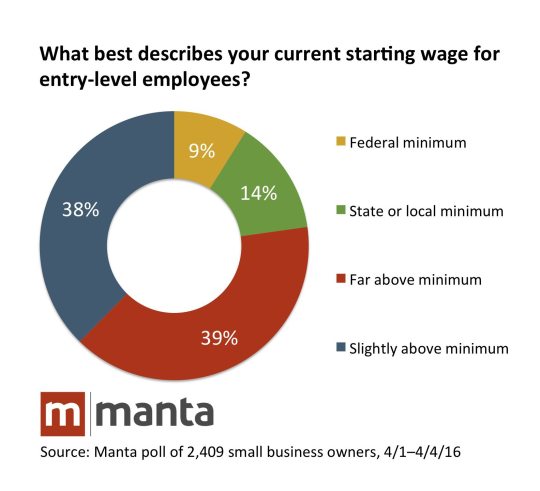Experts say small businesses may be missing out on one of the biggest American economic sectors.
Growing Healthcare Market
Growing healthcare spending comprises 17% of the U.S. GDP and exceeds $2.7 trillion. Nearly one-third of that spending —close to $1 trillion last year–is in hospitals, often the biggest local employers and purchasers of goods and services. Yet many small businesses rarely consider marketing to hospitals.
Hospitals purchase an array of products and services, from food to laundry, from legal and accounting services, to lawn care, information technology and janitorial, as well as drugs and medical supplies. An estimated 75% of that purchasing goes through large regional and national group purchasing organizations (GPOs), such as Premier and Vizient. GPOs contract with suppliers of goods and services, from medical devices and drugs to nonclinical products in large quantities, offering discounts to hospital clients and charging administrative fees. According to industry surveys, 98% of all hospitals belong to at least one GPO.
Many hospital and GPO purchases go through supply chain and logistics firms like Owens & Minor and Cardinal Health. And about one-quarter of hospital spending comes directly through contracts with hospitals.
So how can small businesses tap into that huge market to become hospital vendors and suppliers?
Mike Schiller, senior director of supply chain for the Association for Healthcare Resource & Materials Management, an arm of the American Hospital Association, said GPOs offer “a great way for small businesses to enter the hospital industry.”
Schiller said industry manufacturing and distribution associations assist smaller businesses to access the hospital market. “Associations sponsor trade shows for small businesses hoping to promote their brands and products. Those offer great networking opportunities,” Schiller said. “They often lead to one-on-one conversations with hospitals, health systems or GPOs.”
He advised small businesses to focus on value, patient satisfaction and patient outcomes. “They need to have strategic conversations about how both organizations can benefit,” he said.
Understand the market
Richard Manson, president and CEO of the Nashville, Tenn.-based surgical supply firm, SourceMark, said small businesses should first understand what the healthcare industry is and what drives it.
He said hospitals are divided into numerous categories, by ownership model, geographic location, services and sponsorship. He said that the hospital’s ownership and affiliations determine how they make and who authorizes purchasing decisions, from a local hospital purchasing agent to a remote corporate department or a GPO contracting with the hospital.
Ash Luthra, president of Chicago-based medical device manufacturer and distributor LSL Healthcare, said understanding client needs is crucial to succeeding in the hospital supply market. “When we deal with hospitals, we must meet their specifications at all times. We make medical kits by the millions, but must remember that each case is used on an individual patient. The quality must be built into each case. With hospitals, you must get your product to them on time.”
In addition, he said, small manufacturers should be ISO (International Organization for Standardization) compliant to meet the uniform specifications for medical devices.
Luthra advised small businesses to perform self-assessments to examine their production capacity, explore their service area and determine whether they have sufficient credit lines or capital to back up their orders. “That assessment will give them a good idea what kind of market they can go after, whether they should focus on local hospitals or join a large GPO.”
Todd Ebert, president and CEO of the Health Care Supply Chain Association, a GPO trade group, said small businesses sometimes enter local hospital supply chains with innovative products and services. Ebert pointed out that every GPO offers websites explaining their processes and practices. “Some manufacturers don’t need a GPO and can build up their own distribution network, while others feel GPOs bring access and value and offer visibility to thousands of potential customers,” he explained.
“Everyone is looking for products that can improve patient care or reduce costs. Once you get a contract, whether through a GPO or otherwise, the work isn’t over,” Ebert said.
“You have to keep promoting it and be ready to demonstrate its value proposition.”
Heart surgeon Hilton Hudson, M.D., started his Munster, Ind.-based company initially publishing and selling healthcare books for women and minorities to pharmaceutical companies.
Hudson said the trade publisher HPC (formerly Hilton Publishing Company) also is a service provider to more than 3,000 hospitals. “You have to be more than just a ‘me too’ vendor.
We approach hospital systems with a keen focus on savings, efficiency, centralization and how to cut out unnecessary fat and costs. We focus on processes and management.” The full-time surgeon advised small businesses to become “solution providers”.
Focus on quality
Timothy McCarty, sales manager for the Lenexa, Kan.-based supplier of bariatric surgery products, SizeWise, said Sizewise now contracts with hospitals in almost every major health system nationwide and every major national GPO.
He said corporate growth has derived from focus on product quality and consistency and the cultivation of relationships. “At the end of the day, the oldest sales adage remains true: people buy from those they trust. Take advantage of any networking opportunities you can in your community to seek out hospital vendors or staff members. Create a groundswell of support from the bottom up.”
He recommended obtaining a Federal Supply Schedule position with the Veteran’s Administration pointing out that the VA now has a mandate to contract with small businesses and offers assistance with that process.
Mark Cartwright, senior director of supply diversity at the GPO, Vizient, said most suppliers who contact hospitals directly are referred to GPOs. Cartwright said all GPOs have dedicated supplier diversity programs, which provides opportunities to qualifying small businesses owned by women, ethnic minorities and veterans. They should also know when current contracts expire and register with the U.S. Small Business Administration (SBA), which determines whether their company meets the small business eligibility guidelines. “It doesn’t cost anything and only takes a few minutes to complete,” Cartwright said. “The SBA offers many free tools to small businesses.”
He said much GPO growth in recent years has been in non-medical arenas, like information technology consulting, office supplies, debt collection and language translation services. He said most GPOs have supplier registration systems and websites that include contract bidding information, allowing small businesses to prepare for bids, discover contract requirements and partner with other small businesses or bigger suppliers. Businesses need the financial investment, infrastructure and staffing in place “because the hospitals assume you are ready when they sign
that contract.”
Cartwright said that healthcare is a highly regulated industry and businesses need federal compliance programs in place and may require capital investment. “Many suppliers know this from
other industries and know about IT and cybersecurity assessments,” he said. “Their processes and procedures need to be tight.”
He also noted that most hospitals use third party services to insure their contractors and vendors are up to speed. He said vendor credentialing systems verify whether the systems are legitimate, licensed and up-to-date on their taxes.






